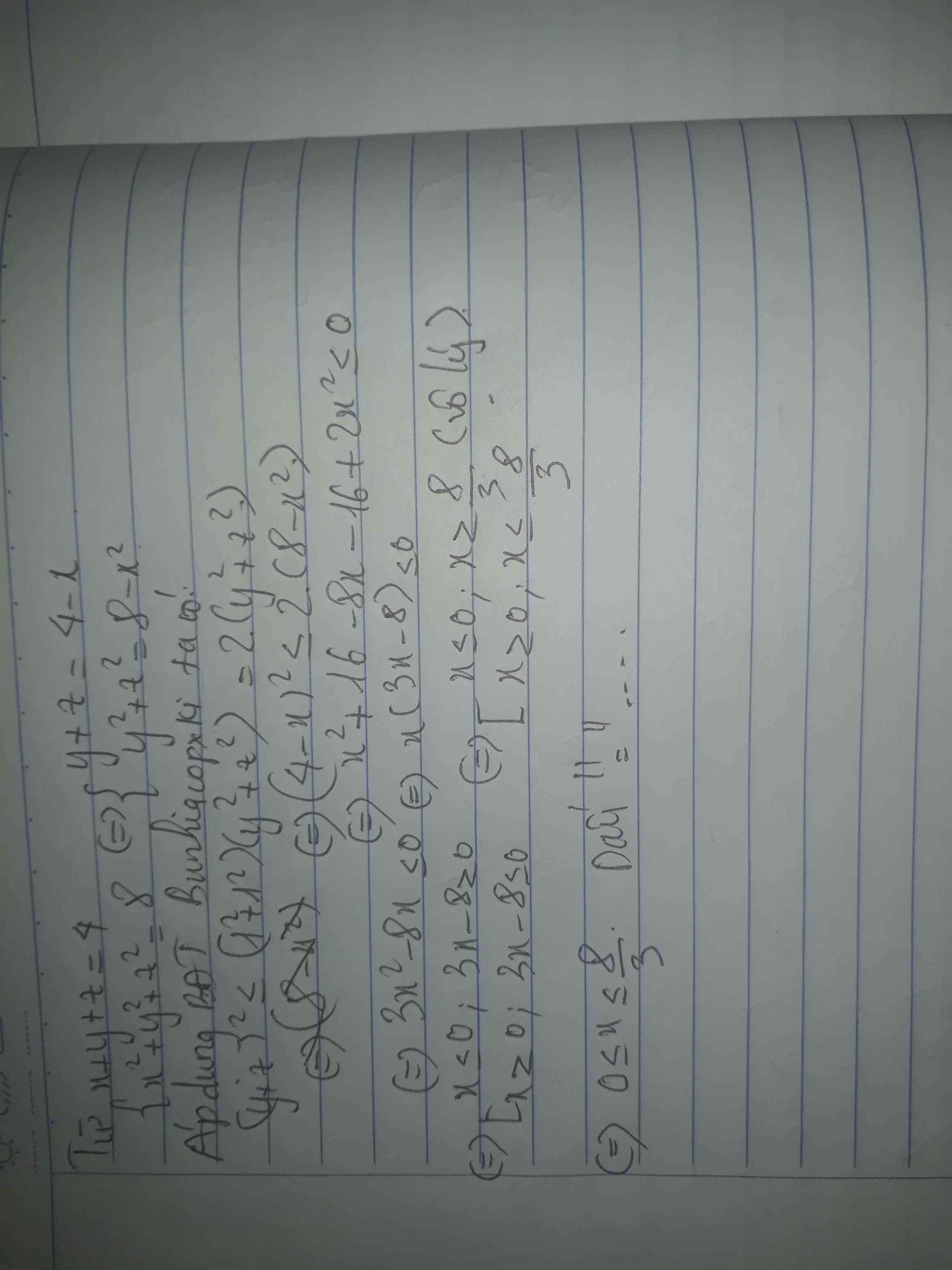Tìm x,y e Z tm \(\dfrac{x^2+y^2}{x+y}=\dfrac{85}{13}\)

Những câu hỏi liên quan
Tìm tất cả các số nguyên x,y thoả: \(\dfrac{x^2+y^2}{x+y}\) = \(\dfrac{85}{13}\)
Xem chi tiết
Tìm x ; y ; z tm :
\(\dfrac{x}{y+z+1}=\dfrac{y}{x+z+1}=\dfrac{z}{y+x-2}=x+y+z\)
a,Cho x,y,z tm \(\left\{{}\begin{matrix}x^2+y^2+z^2=8\\x+y+z=4\end{matrix}\right.\). CM: \(-\dfrac{8}{3}\le x\le\dfrac{8}{3}\)
b, cho \(x^2+3y^2=1\). Tìm GTLN, GTNN của\(P=x-y\)
c, Cho \(P=\dfrac{x^2-\left(x-4y\right)^2}{x^2+4y^2}\left(x^2+y^2>0\right)\)
Tìm GTLN của P
\(c,P=\dfrac{x^2-x^2+8xy-16y^2}{x^2+4y^2}=\dfrac{8\left(\dfrac{x}{y}\right)-16}{\left(\dfrac{x}{y}\right)^2+4}\)
Đặt \(\dfrac{x}{y}=t\)
\(\Leftrightarrow P=\dfrac{8t-16}{t^2+4}\Leftrightarrow Pt^2+4P=8t-16\\ \Leftrightarrow Pt^2-8t+4P+16=0\)
Với \(P=0\Leftrightarrow t=2\)
Với \(P\ne0\Leftrightarrow\Delta'=16-P\left(4P+16\right)\ge0\)
\(\Leftrightarrow-P^2-4P+4\ge0\Leftrightarrow-2-2\sqrt{2}\le P\le-2+2\sqrt{2}\)
Vậy \(P_{max}=-2+2\sqrt{2}\Leftrightarrow t=\dfrac{4}{P}=\dfrac{4}{-2+2\sqrt{2}}=2+\sqrt{2}\)
\(\Leftrightarrow\dfrac{x}{y}=2+2\sqrt{2}\)
Đúng 3
Bình luận (2)
Bài a hình như sai đề rồi bạn.

Đúng 3
Bình luận (2)
\(a,\text{Đặt }\left\{{}\begin{matrix}S=y+z\\P=yz\end{matrix}\right.\\ HPT\Leftrightarrow\left\{{}\begin{matrix}\left(y+z\right)^2-2yz+x^2=8\\x\left(y+z\right)+yz=4\end{matrix}\right.\Leftrightarrow\left\{{}\begin{matrix}S^2-2P+x^2=8\\Sx+P=4\end{matrix}\right.\\ \Leftrightarrow\left\{{}\begin{matrix}S^2-2\left(4-Sx\right)+x^2=8\\P=4-Sx\end{matrix}\right.\\ \Leftrightarrow\left\{{}\begin{matrix}S^2+2Sx+x^2-16=0\left(1\right)\\P=4-Sx\end{matrix}\right.\\ \left(1\right)\Leftrightarrow\left(S+x-4\right)\left(S+x+4\right)=0\\ \Leftrightarrow\left[{}\begin{matrix}S=-x+4\Rightarrow P=\left(x-2\right)^2\\S=-x-4\Rightarrow P=\left(x+2\right)^2\end{matrix}\right.\)
Mà y,z là nghiệm của hệ nên \(S^2-4P\ge0\Leftrightarrow\left[{}\begin{matrix}\left(4-x\right)^2\ge4\left(x-2\right)^2\\\left(-4-x\right)^2\ge4\left(x+2\right)^2\end{matrix}\right.\Leftrightarrow-\dfrac{8}{3}\le x\le\dfrac{8}{3}\)
Đúng 2
Bình luận (0)
Xem thêm câu trả lời
Cho x,y,z>0 tm\(xy+yz+zx\ge3\). C/m
\(\dfrac{x^3}{\sqrt{y^2+3}}+\dfrac{y^3}{\sqrt{z^2+3}}+\dfrac{z^3}{\sqrt{x^2+3}}\ge\dfrac{1}{2}\)
Gọi \(A=\sum\dfrac{x^3}{\sqrt{y^2+3}}\)
Theo Holder: \(A.A.\left(\left(y^2+3\right)+\left(z^2+3\right)+\left(x^2+3\right)\right)\ge\left(x^3+y^3+z^3\right)^3\)
\(\Rightarrow A^2\ge\dfrac{\left(x^3+y^3+z^3\right)^3}{x^2+y^2+z^2+9}\ge\dfrac{\left(x^3+y^3+z^3\right)^3}{x^2+y^2+z^2+3\left(xy+yz+zx\right)}=\dfrac{\left(x^3+y^3+z^3\right)^3}{\left(x+y+z\right)^2+xy+yz+zx}\ge\dfrac{\left(x^3+y^3+z^3\right)^3}{\left(x+y+z\right)^2+\dfrac{\left(x+y+z\right)^2}{3}}\)
Ta có đánh giá sau: \(x^3+y^3+z^3\ge\dfrac{\left(x^2+y^2+z^2\right)^2}{x+y+z}\ge\dfrac{\left(x+y+z\right)^3}{9}\)
\(\Rightarrow A^2\ge\dfrac{\dfrac{\left(x+y+z\right)^3}{9}}{\left(x+y+z\right)^2+\dfrac{\left(x+y+z\right)^2}{3}}=\dfrac{x+y+z}{12}\ge\dfrac{\sqrt{3\left(xy+yz+zx\right)}}{12}\ge\dfrac{1}{4}\)
\(\Rightarrow A\ge\dfrac{1}{2}\)
Đúng 1
Bình luận (0)
cho x,y,z là 3 số thực tm \(x+y+z=18\sqrt{2}\).
Cmr \(\dfrac{1}{\sqrt{x\left(y+z\right)}}+\dfrac{1}{\sqrt{y\left(z+x\right)}}+\dfrac{1}{\sqrt{z\left(x+y\right)}}+2\ge\dfrac{9}{4}\)
mng tham khảo
\(\sqrt{2x\left(y+z\right)}< =\dfrac{2x+y+z}{2}\)
=>\(\dfrac{1}{\sqrt{x\left(y+z\right)}}>=\dfrac{2\sqrt{2}}{2x+y+z}\)
=>\(P>=2\sqrt{2}\left(\dfrac{1}{2x+y+z}+\dfrac{1}{x+2y+z}+\dfrac{1}{x+y+2z}\right)\)
\(\Leftrightarrow P>=2\sqrt{2}\cdot\dfrac{\left(1+1+1\right)^2}{\left(2x+y+z\right)+x+2y+z+x+y+2z}=\dfrac{18\sqrt{2}}{4\cdot18\sqrt{2}}=\dfrac{1}{4}\)
Dấu = xảy ra khi x=y=z=6căn 2
Đúng 2
Bình luận (0)
Cho x, y, z dương TM: \(\sqrt{x}+\sqrt{y}+\sqrt{z}=1\)
Tìm min \(T=\dfrac{x^2}{y}+\dfrac{y^2}{z}+\dfrac{z^2}{x}-\left(x-y\right)^2-\left(y-z\right)^2-\left(z-x\right)^2\)
Cho a ; b ; c ; x ; y ; z \(\ne\) 0 tm : \(\dfrac{x}{a}=\dfrac{y}{b}=\dfrac{z}{c}\)
CM: \(\dfrac{a^2}{x}+\dfrac{b^2}{y}+\dfrac{c^2}{z}=\dfrac{\left(a+b+c\right)^2}{x+y+z}\)
Cho x, y, z là các số thực dương TM: \(x+y+z\le1\)
Tìm min \(Q=2\left(x+y+z\right)+3\left(\dfrac{1}{x}+\dfrac{1}{y}+\dfrac{1}{z}\right)\)
\(Q\ge2\left(x+y+z\right)+3.\frac{9}{x+y+z}=2\left(x+y+z\right)+\frac{27}{x+y+z}.\)
Đặt X+Y+Z=t (\(t\le1\))
\(Q\ge2t+\frac{27}{t}=\left(2t+\frac{2}{t}\right)+\frac{25}{t}\ge2\sqrt{2t.\frac{2}{t}}+\frac{25}{1}=4+25=29\\ \)
Dấu = xảy ra khi x=y=z=1/3
Đúng 0
Bình luận (0)
Theo bđt cô si ta có : \(x+y+z\ge3\sqrt[3]{xyz}\) và \(\frac{1}{x}+\frac{1}{y}+\frac{1}{z}\ge3\sqrt[3]{\frac{1}{xyz}}\)
=> \(Q\ge6\sqrt[3]{xyz}+9\sqrt[3]{\frac{1}{xyz}}\ge2\sqrt{6\sqrt[3]{xyz}\cdot9\sqrt[3]{\frac{1}{xyz}}}=6\sqrt{6}\)
Dấu = xảy ra khi : \(6\sqrt[3]{xyz}=9\sqrt[3]{\frac{1}{xyz}}\) Giải ra ta đc : \(xyz=\frac{3}{2}\sqrt{\frac{3}{2}}\)
Đúng 0
Bình luận (0)
bạn hiếu làm sai rồi, Min Q=29 khi x=y=z=1/3
Đúng 0
Bình luận (0)
Tìm tất cả các số x,y,z biết: \(\dfrac{x}{y+z+1}=\dfrac{y}{x+z+2}=\dfrac{z}{x+y-3}=x+y+z\)
Giair chi tiết hộ e vs ạ.
gợi ý nè:
thử cộng chúng lại xem
\(\dfrac{x}{y+z+1}\) = \(\dfrac{y}{x+z+2}\) = \(\dfrac{z}{x+y-3}\) = \(x+y+z\)
Áp dụng tính chất dãy tỉ số bằng nhau ta có:
\(\dfrac{x}{y+z+1}\)=\(\dfrac{y}{x+z+2}\)=\(\dfrac{z}{x+y-3}\)=\(\dfrac{x+y+z}{y+z+1+x+z+2+x+y-3}\)
\(x+y+z\) = \(\dfrac{x+y+z}{2.\left(x+y+z\right)}\) = \(\dfrac{1}{2}\) (1)
\(\dfrac{x}{y+z+1}\) = \(\dfrac{1}{2}\) ⇒ 2\(x\) = y+z+1
⇒ 2\(x\) + \(x\) = \(x+y+z+1\) (2)
Thay (1) vào (2) ta có: 2\(x\) + \(x\) = \(\dfrac{1}{2}\) + 1
3\(x\) = \(\dfrac{3}{2}\) ⇒ \(x=\dfrac{1}{2}\)
\(\dfrac{y}{x+z+2}\) = \(\dfrac{1}{2}\) ⇒ 2y = \(x+z+2\) ⇒ 2y+y = \(x+y+z+2\) (3)
Thay (1) vào (3) ta có: 2y + y = \(\dfrac{1}{2}\) + 2
3y = \(\dfrac{5}{2}\) ⇒ y = \(\dfrac{5}{6}\)
Thay \(x=\dfrac{1}{2};y=\dfrac{5}{6}\) vào (1) ta có: \(\dfrac{1}{2}+\dfrac{5}{6}+z\) = \(\dfrac{1}{2}\)
\(\dfrac{5}{6}\) + z = 0 ⇒ z = - \(\dfrac{5}{6}\)
Kết luận: (\(x;y;z\)) = (\(\dfrac{1}{2}\); \(\dfrac{5}{6}\); - \(\dfrac{5}{6}\))
Đúng 1
Bình luận (0)






















